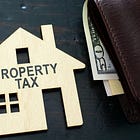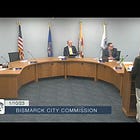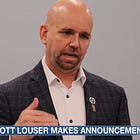Punishing Local Property Tax Reform Efforts
A potential error may end up causing extra hardship for local governments that have actually tried to fix their property tax dilemmas. But was it really an error?
Earlier this week, I sent out a comprehensive analysis of the property tax quagmire in North Dakota covering the last 20+ years.
Today we learn that HB 1176, which was Governor Armstrong’s property tax reform/relief bill, has one glaring error: it punishes local governments and local citizens that would or have approved local sales tax measures to alleviate their own property tax burdens.
You will recall that HB 1176 sought to create a large property tax credit for primary resident homeowners that actually live in their homes.
This plan eventually ended up creating a $1,600 property tax credit for primary resident homeowners that actually live in their homes, and a 3% cap on property tax revenue generated from existing property. (Revenue from growth is not capped the 1st year it is taxed.)
Buried in HB 1176 is the details on what the 3% is based on: the highest amount in the previous 3 years:
This sounds fine, until you realize that many cities and counties have be passing measures to reduce their property tax burden by swapping sales tax revenue to offset property tax revenue - as we did in Burleigh County!
So, because Burleigh County was pro-active in alleviating property tax burdens for its citizens, and and passed a ballot measure to reduce/offset the amount of property tax mills needed, it is slated to be punished in year 3 of the this new law.
You might think that’s plenty of time to fix the problem - however, as the law sits, it punishes local governments that try to reduce their own property taxes by reducing the dollars generated by the 3% cap.
An Error, Or Intentional?
At first, I thought this was just a basic mistake: an unintended consequence. But then, I started to realize that this “error” actually implements policies that the legislature has wanted for a while: to limit the growth of sales tax, even at the cost of higher property taxes.
In fact, there was a bill this session to explicitly cap local sales at 3% (HB 1552) because legislators feared sales tax would increase too fast - even if it were applied to reducing property taxes.
That bill failed, but it was not the only time the legislature got in the way of letting locals fix local problems.
The legislature has also repeatedly rejected Bismarck’s requests to be empowered to reduce its reliance on special assessments for street maintenance:
As many of you know, I have been involved with the City of Bismarck Special Assessment Task Force since 2017, and we are still begging the legislature to allow us to find solutions to special assessments.
And all of this ignores the efforts this session to punish local governments with reduced state funding if they dare to represent their constituents on issues the state has deemed to be priorities:
Conclusions
The legislative solution to this is easy: treat sales tax dollars approved by the voters to explicitly replace property tax revenue as part of the baseline for the property tax cap. Of course, that means many cities and counties will raise their revenues more than 3% because they already made moves to address property taxes!
If the legislature did not intend to punish local governments who try to fix their property tax issues, it needs to fix this situation.
However, at this time, I’m not entirely sure this was an accident. (If it was just an honest mistake, that would confirm not enough legislators understand how property taxes work themselves to be able to fix the problem.)
The evidence of the desire to put a damper on governments generally leads me to believe that if this was an accident, many legislators will smile about it.
Which would probably be the sort of revelation that would resurrect the notion of simply eliminating K-12 education property taxes and fully funding education as the North Dakota constitution says:





















"You will own nothing and be happy", the mantra of the WEF seems the program. Just make private property untenable over the years, a nonstop squeeze.